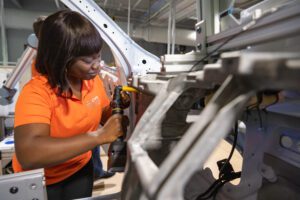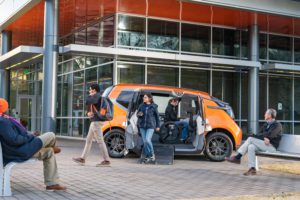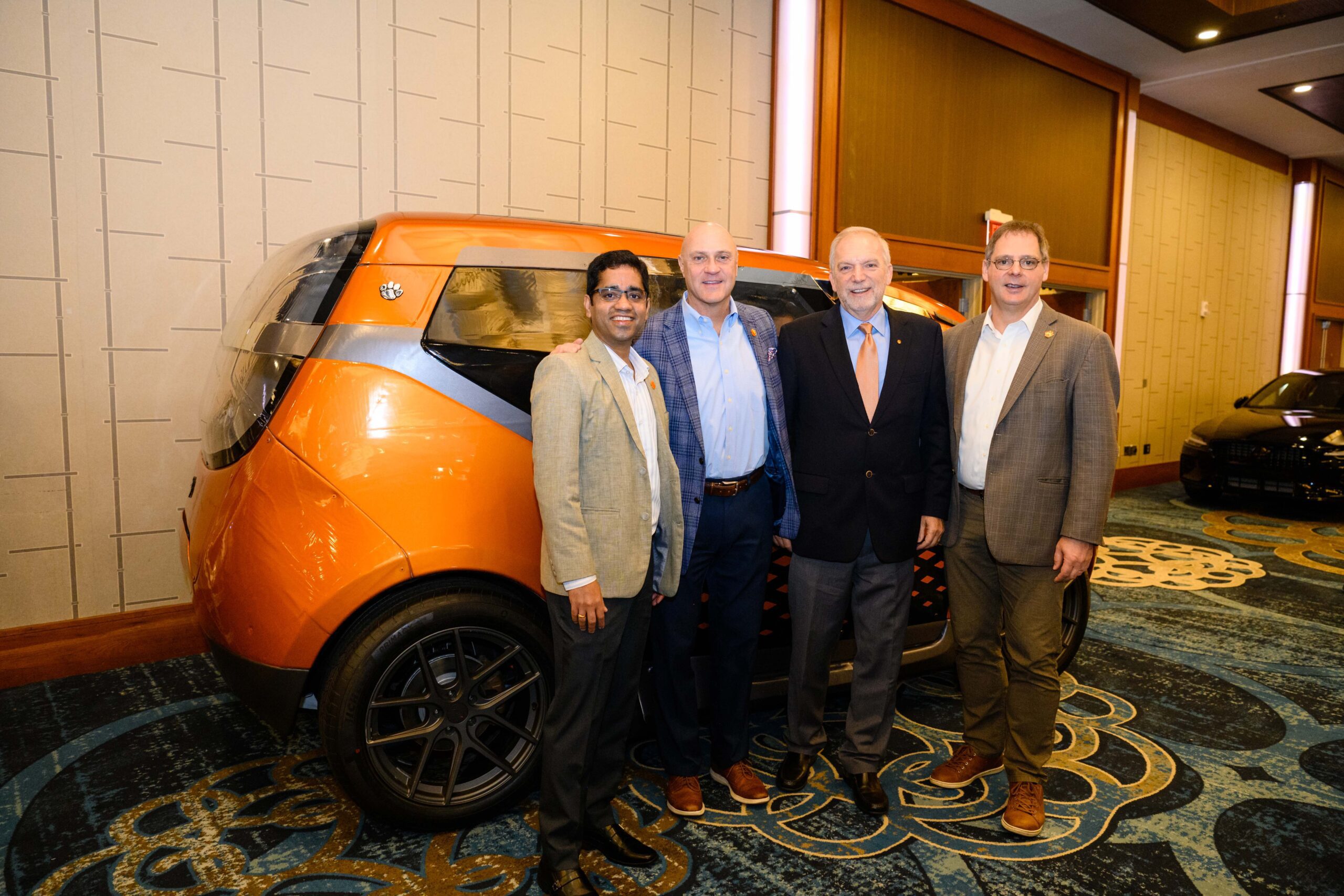Bachelor’s in Automotive Engineering
Clemson University is launching the nation’s first undergraduate Bachelor of Science program in automotive engineering to meet the rapidly changing needs of an industry that is starting to trade the internal combustion engine for batteries and human drivers for self-driving cars. Bachelor’s in Automotive Engineering.
The new program solidifies Clemson’s position as the premier University for automotive engineering research and education in the Southeast and beyond and adds to the offerings at its award-winning Greenville campus, the Clemson University International Center for Automotive Research (CU-ICAR).
The degree program’s creators expect it will help meet massive demand for a new breed of automotive engineer to lead the design and manufacture of cars and trucks that are quickly becoming computers on wheels powered by electricity.
“Clemson University will continue to lead the way for automotive engineering,” said President Jim Clements. “We are at the heart of the Southeast’s auto industry, and as South Carolina’s leading provider of engineering talent, Clemson is uniquely positioned to launch the nation’s first Bachelor of Science degree in automotive engineering. Through working in tandem with industry, state and federal partners, we are able to shape the future of mobility and create a robust workforce.”
Students can expect an interdisciplinary curriculum with a strong experiential learning component that is aimed at preparing them for the future of automotive manufacturing with an emphasis on cutting-edge technologies ranging from electric vehicles, advanced materials, advanced manufacturing and semiconductors to e-hailing, artificial intelligence and autonomous vehicle software.
The program’s creators expect it to launch with as many as 30 students in fall 2023 and grow to over 200 by fall 2027.
Undergraduates majoring in automotive engineering will be based on the main campus for their first two years, providing them the opportunity to immerse themselves in the full Clemson Experience, including cheering on the Tigers football team in Memorial Stadium, swimming in Lake Hartwell and eating ice cream at the ’55 Exchange.
For their final two years, students will shift to CU-ICAR, a campus that is home to Clemson’s automotive engineering faculty and graduate program. On the campus, they will be able to take full advantage of the unique experimental facilities and the expertise located there.

A bus service already in place connects CU-ICAR to the main campus 45 minutes away.
Clemson launched its graduate program in automotive engineering in 2006 and was the first university in the country to graduate a Ph.D. student in automotive engineering and the first to graduate a woman with a Ph.D. in automotive engineering.
Zoran Filipi, founding director of the School of Mechanical and Automotive Engineering, said Clemson will build on talent and infrastructure already in place to create the undergraduate program.
“Some of the world’s leading thought leaders and most creative innovators in automotive engineering are on the faculty in the School of Mechanical and Automotive Engineering,” Filipi said. “We offer cutting-edge facilities, impactful learning experiences and opportunities to collaborate closely with industry partners. Clemson is uniquely positioned to lead in automotive engineering at both the graduate and undergraduate levels.”
Geographic Advantage
Clemson also has a unique geographic advantage that helps position the University to offer the program. The auto industry in South Carolina employs 74,000 and has an economic impact of $27 billion, according to the state Department of Commerce.
The broader Southeast region is home to a growing number of Original Equipment Manufacturers. Within 500 miles of Clemson, the community includes BMW, Volvo, Proterrra, Mercedes-Benz Vans, Honda, Tesla, Ford, General Motors, Toyota, Mazda, Nissan and Kia. Each brings a network of suppliers that also create jobs.
The switch to autonomous and electric cars could create as many as 115,000 additional U.S. automotive and mobility industry jobs in the coming decade, including 45,000 for mobility engineers alone, according to a 2019 report by Boston Consulting Group.

Several recent investments that are helping create those jobs in South Carolina were mentioned in Gov. Henry McMaster’s Jan. 25 State of the State address.
To name a few examples:
Redwood Materials will invest $3.5 billion for a new battery materials recycling facility, the single largest announcement in the history of South Carolina.
BMW is investing $1 billion to prepare its Spartanburg plant to produce electric vehicles and $700 million to build a new, high-voltage battery assembly facility.
Bosch plans to invest $200 million in Anderson County to create the company’s first production operation of fuel cell technology in the United States and another $260 million as Bosch launches production of electric motors in Dorchester County to support the U.S. market demand for electrified vehicles.
Laine Mears, chair of the Department of Automotive Engineering, said demand for automotive engineers is soaring.
“The entire global automotive industry is turning on a dime, and Clemson is stepping up to take the lead to meet industry’s changing needs for both technology and workforce,” he said. “The new undergraduate degree will be a truly integrative program that brings together talent from across a spectrum of disciplines, preparing students for the challenges of the future.”
General Engineering
Students will start with a General Engineering curriculum that includes calculus, physics and other foundational courses required of engineering majors at Clemson. After their first year, students will be eligible to begin taking automotive engineering classes.
By their senior year, students will be ready to work on Deep Orange prototype vehicles as capstone projects.
Those who complete the undergraduate program will receive a Bachelor of Science in automotive engineering. Students who decide to join the first cohort are currently in their first year in college and would be on track to graduate in 2026.
Srikanth Pilla, the ExxonMobil Employees Endowed Chair and Professor of Automotive Engineering, led the development of the curriculum for the new undergraduate program.
“While the new degree program was created in an automotive context, the curriculum has been designed broadly enough that impactful experiences will reach far beyond the car, and students will be well-qualified for a number of careers in the mobility and technology workforces,” said Pilla, who is also the founding director of AIM for Composites Energy Frontier Research Center and the Clemson Composites Center.
“Employers could range from car and aerospace companies to the U.S. Army and software companies such as Google, Apple and Meta. This is a robust curriculum filled with hands-on learning experiences aimed at preparing students to make a contribution on day one of their careers.”

The undergraduate degree adds to a growing list of marquee programs at CU-ICAR that include:
A graduate program that has graduated 791 master’s students and 100 Ph.D. students, with virtually all finding jobs in the automotive industry or academia
Deep Orange, a program that gives students a chance to design and build a prototype vehicle, mirroring the experience of working at an original equipment manufacturer or supplier
Virtual Prototyping of Autonomy-Enabled Ground Systems (VIPR-GS), an organization that is part of a research partnership aimed at developing innovative virtual prototyping tools to design the next generation of autonomy-enabled, on- and off-road vehicles, with the U.S. government committing up to $100 million
AIM for Composites, an Energy Frontier Research Center that is advancing how composite materials are created through artificial intelligence and inverse engineering
Clemson’s new undergraduate program will differ from automotive specialties in traditional departments and automotive. While technology programs concentrate on manufacturing, routine design, construction and end operations, Clemson is going beyond the technical requirements by creating an automotive engineering degree that will focus on advanced design, development and technical management of the vehicle realization process.
Workforce Needs
Anand Gramopadhye, dean of the College of Engineering, Computing and Applied Sciences, said Clemson’s new undergraduate degree program will help meet workforce needs for the growing automotive industry.
“This multidisciplinary program brings together top talent, cutting-edge facilities and impactful experiences to create the leaders, innovators and entrepreneurs of the future,” he said. “By creating the future workforce, the program will help strengthen the automotive industry in South Carolina and the broader Southeastern region. I thank the team that designed the new program and congratulate its members on a job well done.”
 (Left to right) Srikanth Pilla, ExxonMobil Employees Endowed Chair and Professor of Automotive Engineering; Clemson University President Jim Clements; Zoran Filipi, founding director of the School of Mechanical and Automotive Engineering; and Chris Paredis, BMW Chair in Systems Integration stand in front of the Deep Orange concept car after an announcement that Clemson University will be home to the nation’s first automotive engineering undergraduate degree program. Bachelor’s in Automotive Engineering.
(Left to right) Srikanth Pilla, ExxonMobil Employees Endowed Chair and Professor of Automotive Engineering; Clemson University President Jim Clements; Zoran Filipi, founding director of the School of Mechanical and Automotive Engineering; and Chris Paredis, BMW Chair in Systems Integration stand in front of the Deep Orange concept car after an announcement that Clemson University will be home to the nation’s first automotive engineering undergraduate degree program. Bachelor’s in Automotive Engineering.
Source: Bachelor’s in Automotive Engineering
https://www.techedmagazine.com/category/news-by-industry/transportation-education/

